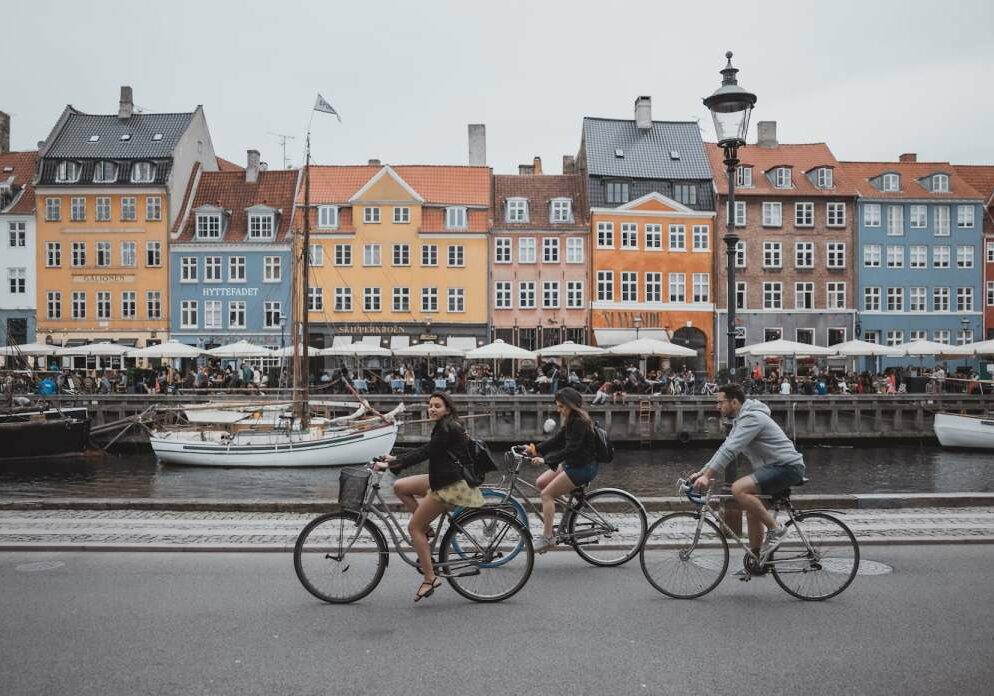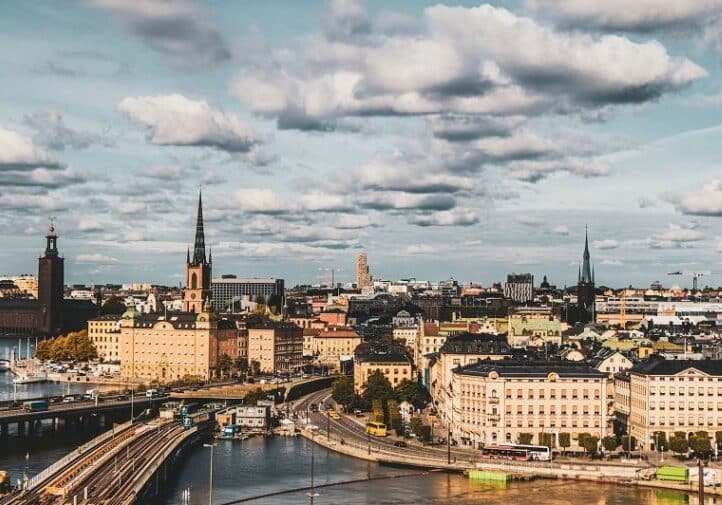When choosing the best countries to live in, consider factors like economic health, quality of life, and cost of living. A country’s GDP is key because it shows the overall wealth and job opportunities available, which can lead to a better life for residents. Look for countries with welcoming communities, universal healthcare, and social equality, as these factors can greatly enhance your experience. With a booming economy and a focus on inclusivity, you can find the perfect country that suits your needs and lifestyle.
This guide will highlight the best countries to live in, focusing on countries with economic stability, healthcare, safety, and inclusivity. We also highlight the Quality of Life index ranking based on our report created by the Global Citizen Solution Intelligence Unit, as well as the average cost of living and the average salary, to help you further envision your new life in these strong countries.
We will cover:
Top Ten Best Countries to Live in 2025
1. Denmark
Denmark is at the top of the list of the top ten countries for quality of life. This small Nordic country consistently ranks highly in international surveys on factors like happiness, income equality, safety, and access to education. It’s also a global leader in social welfare.
Quality of life
The Danish lifestyle is relaxed and stress-free, with plenty of opportunities to enjoy the great outdoors. The country is renowned for its bike-friendliness, from large cities like Copenhagen to small island towns like the South Funen Archipelago, and it’s easy to get around without a car. It is no surprise that the country ranks fourth on our Quality of Life Index.
Denmark has many visas offering temporary residency, such as a work visa, student visa, or short-term Visa (Schengen Visa), which allows stays up to 90 days for tourism, business, or family visits. However, by obtaining citizenship by investment in the European Union, you can access free higher education in Denmark as an EU citizen.
Healthcare
The Danes have one of the best-quality healthcare systems, as evidenced by their citizens’ high lifespans and low mortality rates. The universal healthcare system runs under a well-developed public health insurance scheme that requires registration with the Danish Civil Registration System.
Education
Education is also held to a high standard. The Danish government upholds the principle of free education at all levels. Regardless of what you choose to study or which public university you attend, there are no charges incurred or student loans to pay back.
Cost of living
Denmark is known for its high living costs, especially in cities like Copenhagen, but many expats find that the quality of life and welfare services balance these costs. Monthly expenses in Copenhagen typically range from $2,500 to $3,400, with housing and dining being among the more expensive items.
Metric | Value |
GDP | $408.51 billion |
Average Annual Salary | $67,707 |
Average Cost of Living | $3,400/month |
Quality of Life Ranking | 4 |
2. Norway
Although most Northern European countries enjoy many quality of life benefits, Norway, the largest country on the Scandinavian Peninsula, ranks among the highest on the Human Development Index.
Quality of life
Simple factors such as good governance, income equality, civil rights, low unemployment, and a high net worth per capita allow people living in Norway to enjoy a high standard of living in one of the best quality-of-life countries in Europe. It was also the first country in Scandinavia to legalize same-sex marriage. It’s one of the best countries in the world to work, with an average salary of $55,000 compared to $51,480 in the United States.
Healthcare
Like most Nordic countries, Norway has an excellent healthcare system that is efficient and simple. Private medical insurance is not required, as all residents have access to free health care paid for by government taxes. The government subsidizes prescriptions and has a low universal cost, making them very affordable regardless of what kind of treatment you require.
Education
Not only is Norway’s well-developed public education system free, but EU and EEA students are also eligible to receive a free bursary to support their education that does not need to be paid back. Although international students no longer have access to free university education in Norway, the tuition fees are significantly lower than what students pay in the US, averaging 130,000 NOK (about $12,000) per semester.
Cost of living
Norway is another one of the more expensive countries in Europe, with Oslo and Bergen having higher living costs. Monthly expenses in Oslo generally range from $2,700 to $3,500, while s
maller towns may be slightly more affordable.
Metric | Value |
GDP | $482.23 billion |
Average Annual Salary | $72,829 |
Average Cost of Living | $3,500/month |
Quality of Life Ranking | 8 |
3. Sweden
The most populous nation on the Scandinavian Peninsula, Sweden is often regarded as one of the best countries in the world to settle down in year after year, and it’s no wonder why.
Quality of life
Sweden offers a fantastic standard of living and is often ranked as one of the best countries for expats. It has a high level of freedom, low crime, a strong economy, and plenty of well-paying job opportunities. Although living costs can be high, Sweden’s safety and quality of life make it a top choice. While Swedish is the main language, nearly 90% of the population under 60 speaks fluent English, making it welcoming for English-speaking expats, especially Americans.
Healthcare
Unlike most Scandinavian nations, the Swedish healthcare system is decentralized and mainly government-funded. Still, local authorities decide how it’s run and how much the total healthcare budget will be through local taxes. The level of care you receive in one municipality could be slightly better or worse than in another, although the country generally provides high-quality healthcare overall. Private global health insurance is available for those who want access to more healthcare options and faster treatment. It costs as little as $375 annually.
Education
Sweden has a tax-funded, well-developed, and decentralized public education system. The government grants local authorities autonomy in designing course curricula as long as national standardized goals are met. A growing number of independent educational institutions in the country are also funded through taxes. Children can choose whether to attend a public municipal school or an independent one. Additionally, from the age of three, the STEM (science, technology, engineering, and mathematics) curriculum is heavily incorporated into schools.
Cost of living
Sweden can be moderately expensive, with cities like Stockholm having higher living costs. Monthly expenses in Stockholm range from $1,800 to $2,900, with housing and dining being the main expenses. Smaller cities and rural areas offer a more affordable lifestyle.
Metric | Value |
GDP | $615.67 billion |
Average Annual Salary | $51,745 |
Average Cost of Living | $2,900/month |
Quality of Life Ranking | 1 |
4. Switzerland
A historically wealthy nation, Switzerland ranks and has a long-standing reputation as a haven for the wealthy. It’s also a haven for expats seeking a high standard of living from a new life abroad.
Quality of life
It is home to the World Economic Forum and is one of the world’s wealthiest countries per capita. It has one of the world’s most stable political systems and has long been neutral regarding politics. Swiss residents benefit from outstanding governance. Everything is highly refined, from public transport and healthcare to state education and digital services.
Healthcare
Switzerland has a mandatory private health insurance system, ensuring residents access to affordable medical coverage, with costs ranging from $330 to $2,750 per year. Each canton manages its policies, but residents can expect high-quality healthcare.
Education
Switzerland ranks highly in education, offering free public secondary education and practical training. A recent OECD survey of educational standards among 15-year-olds placed ninth out of 65 countries. The country also provides vocational education and training (VET) programs that combine classroom learning with on-the-job experience. Children with special educational needs receive free schooling and support until age 20.
Cost of living
Although Switzerland has one of the highest living costs of all European countries, the average salary is one of the highest in Europe, and the country ranked the highest in the 2022 Human Development Index. Monthly living expenses in Zurich range from $2,500 to $3,500, depending on accommodation and lifestyle choices.
Metric | Value |
GDP | $824.74 billion |
Average Annual Salary | $93,827 |
Average Cost of Living | $2,500/month |
Quality of Life Ranking | 46 |
5. Australia
Ranked in the top ten countries for multiple studies, including human development, education, and the best countries for women, there are countless reasons why Australia is considered the number one English-speaking country with the best quality of life.
Quality of life
Although slightly further afield, the most populous nation in Oceania has a number of excellent quality-of-life factors that make it the perfect home away from home. The country has a stable and strong economy and maintains political neutrality. Additionally, Australia ranks as having a high standard of living regarding healthcare, a wide range of educational opportunities, a safe environment, and a welcoming community.
Healthcare
The nation also ranks in the top ten countries for average lifespan based on the UN Population Division. Australia’s healthcare system, known as Medicare, provides all residents with access to essential medical services at no or low cost. Medicare covers hospital visits, doctor consultations, and other necessary treatments. Expats can access Medicare if they are permanent residents, while temporary residents typically need private health insurance.
Education
Australia is home to a world-class education system, offering high-quality public and private schools and prestigious universities. Public education is free for residents and expats, although there may be some additional costs for materials and extracurricular activities. Primary and secondary education includes a broad curriculum that is perfect for students to find their passion. The country is also known for its top universities, such as the University of Melbourne, the Australian National University, and the University of Sydney.
Cost of living
The cost of living in Australia can be relatively high, especially in major cities like Sydney and Melbourne, where rent, dining out, and entertainment expenses can add up quickly. In these cities, monthly living costs can range from $2,500 per month or more, depending on lifestyle choices
Metric | Value |
GDP | $1.53 trillion |
Average Annual Salary | $54,126 |
Average Cost of Living | $2,500/mont h |
Quality of Life Ranking | 24 |
6. The Netherlands
The Netherlands is a liberal paradise and among the countries with the highest quality of life to match. Dutch people are known for being welcoming and accepting of people of different cultures and beliefs.
Quality of life
Despite having the highest population density of all the large economies in the European Union, the Netherlands’ profound cycling culture consistently places it in high positions on low air pollution indexes. It maintains clean air quality even in compact cities.
Healthcare
Healthcare in the Netherlands is excellent, with a strong public health system that provides quality services to all residents. The system operates under a mandatory health insurance scheme where
everyone must have basic insurance covering primary and specialist care. The quality of care is consistent nationwide, with an emphasis on preventive health services and patient-centered care. Expats may opt for private health insurance for additional services or faster access but are assured of receiving dependable care through the public system.
Education
The Netherlands is known for its high-quality education system, which emphasizes critical thinking, creativity, and multilingualism. Public schools are free and offer a curriculum that encourages independence and problem-solving skills.
According to the most recent Global Education Report, the Netherlands’ education system stands out due to its affordability and moderate comparative living costs as well as the creation of an innovation ecosystem.
For expats, there are many English-language international schools and bilingual programs in Dutch public schools. Higher education is also world-class, with numerous universities offering programs in English.
Cost of Living
While the Netherlands’s cost of living is relatively high compared to some other European countries, it is manageable and reflects the high quality of services available. In major cities like Amsterdam, monthly living expenses average between $2,500 and $3,000, largely driven by housing costs.
Metric | Value |
GDP | $1.04 trillion |
Average Annual Salary | $57,335 |
Average Cost of Living | $2,500/mont h |
Quality of Life Ranking | 7 |
7. Finland
There’s no place I’d rather be, and it is probably a fitting line for Finns. Rated as the world’s happiest country for five years in a row, it proves that Finnish citizens must be happy with the high standard of living in Finland.
There are many reasons why Finns live such happy lives. A big reason goes back to Finnish culture, which is accepting and focuses less on negative emotions and tough times.
Quality of life
But this isn’t the only reason why Finns are happy. Although this relatively isolated country in northern Europe can be a bit pricey due to high-income taxes, the benefits are enormous. Crime rates are criminally low, and it’s one of the safest countries in the world. It also has the lowest pollution and the best air quality in the world. Tap water purity is also amongst the highest in any nation.
Healthcare
Finland has one of the best healthcare systems in the world, offering universal healthcare to all residents, including expats. The country has a mix of public and private healthcare, with primary care available through government health centers and specialized hospital services. Expats are required to register for Finnish health insurance if they plan to stay long-term, but private healthcare options are available for those who want quicker access to additional services.
Education
Daycare is heavily subsidized by the government and is calculated based on income, costing a maximum of €342 per month for full-time daycare, as opposed to a market-based
economy like the US, with an average cost of $840. Generally, Finland’s education system is great. Many international schools offer English-language curricula, making it easy for children to integrate into the educational system. Higher education in Finland is also free for EU residents and offers a range of English-language programs for international students.
Cost of living
While Finland is known for its high living standards, the cost of living can be high, particularly in cities like Helsinki. Monthly living expenses in Helsinki typically range between €1,800 and €2,500, depending on lifestyle and housing choices. However, outside the capital, costs tend to be more affordable.
Metric | Value |
GDP | $300.74 billion |
Average Annual Salary | $54,559 |
Average Cost of Living | $2,500/month |
Quality of Life Ranking | 2 |
8. Germany
According to expats living with family and young adults, Germany receives frequent praise for being among European Union countries with the highest standard of living. It’s the nation that is home to the most expats in Europe, making it one of the easiest countries to immigrate to.
Quality of life
Expats rave about Germany’s efficient infrastructure, the abundance of available activities, public services, income equality, and work opportunities in a wide range of industries as some of the main reasons why it’s such a great place to
The country has a rich cultural heritage and is home to some of the world’s most famous tourist destinations, like its capital cities, Munich, Berlin, and Hamburg. Germans also have the second highest-ranking passport in the world on the Global Passport Index, which measures the strength of a nation’s passport. Furthermore, Germany is one of the biggest contributors to the United Nations, demonstrating its dedication to peace.
Healthcare
Germany has one of the most advanced healthcare systems in the world, offering universal coverage through a mix of public and private insurance. Expats living in Germany must register with one of the public health insurance providers, ensuring access to high-quality medical care.
Education
Germany is known for its strong education system, which offers high-quality education from primary school through university. Public education is free for all residents, including expats, and the curriculum emphasizes critical thinking and creativity. Germany’s university system is one of the best in Europe, with numerous top-ranked institutions, many of which offer free education or low tuition fees for residents.
Cost of living
The cost of living in Germany can vary depending on the city and lifestyle. Major cities like Munich and Frankfurt tend to be more expensive, with monthly living costs ranging between €2,000 and €3,000, including rent, groceries, and transportation.
Metric | Value |
GDP | $4.14 trillion |
Average Annual Salary | $50,225 |
Average Cost of Living | $3,000/mont h |
Quality of Life Ranking | 3 |
9. Portugal
If you’re seeking the best countries for Americans to retire abroad, you’ve probably already found that Portugal in Western Europe consistently tops many online lists.
Quality of life
What Portugal offers in terms of standard of living is hard for any nation in the European Union and worldwide to beat. Portugal also has one of the lowest crime rates compared to other EU countries. It has consistently ranked amongst the top nations on the Global Peace Index, which measures everything from violent crime and incarceration rates to terrorism threats and political instability.
For expats looking to settle down in Europe, the residency permit offered through the Portugal Golden Visa program is one of the most accessible routes. It requires a minimum investment of €250,000. However, there is also the Portugal D7 Visa, designed for non-EU citizens with income sources such as pensions, savings, or rental income to live in the country. The diverse options to obtain a residency permit make it a top contender for Americans moving to Europe.
Healthcare
Portugal has a well-established, high-quality healthcare system. The public healthcare system, Serviço Nacional de Saúde (SNS), provides affordable healthcare to all residents, including expats who are registered in the system. While public healthcare is generally excellent, many expats opt for private health insurance to avoid longer waiting times or to have more flexibility in choosing doctors and hospitals.
Education
The country’s education system is also among the best, offering different public and private schools. Public education is free and accessible to all residents, and students in Portugal are taught in Portuguese, though some international schools offer bilingual or English-language instruction. Portugal’s universities are also highly ranked, with the University of Lisbon and the University of Porto being among the top in Europe.
Cost of living
Portugal is one of the more affordable countries in Western Europe, with the cost of living significantly lower than in other European countries like France, Germany, or the UK. Monthly living expenses in cities like Lisbon or Porto can range from approximately $1,600 to $2,100, depending on lifestyle and accommodation choices.
Metric | Value |
GDP | $289 billion |
Average Annual Salary | $27,600 |
Average Cost of Living | $1,600/mont h |
Quality of Life Ranking | 6 |
How to Choose the Best Countries to Live in
Choosing your ideal option from the best countries to live in is a deeply personal decision influenced by various factors. Each factor is influenced by individual preferences, needs, and aspirations. However, several key considerations can help guide this significant choice.
Quality of life
Research the quality of life in potential countries, including factors such as healthcare, safety, education, and environmental quality. Countries that rank high in these areas often provide a more comfortable and secure living environment. To get a comparative view, look into indexes and reports that rank countries based on quality-of-life indicators.
Cost of living
Evaluate the cost of living in relation to the standard of living in various countries. This includes the cost of housing, food, transportation, and other essentials. It’s important to consider not just the absolute costs but how they compare to average incomes in those countries to ensure you can maintain or improve your current standard of living. For example, Portugal has been rated as one of the best places to live for an expat because of its affordable living costs.
Employment opportunities
Consider the job market and employment opportunities, especially in your field of expertise. Some countries may offer more opportunities in certain industries or have a higher demand for specific skills. Research the ease of finding employment, average salaries, working conditions, and work culture in your field.
Cultural fit and language
Think about the cultural aspects of potential countries, including language, traditions, and social norms. Living in a country where you can easily adapt to the culture and communicate in the local language (or where there’s a willingness to accommodate English speakers if that’s your primary language) can greatly enhance your integration and overall experience.
Immigration policies and residency Rights
Investigate the immigration policies of the countries you are considering. Some countries have more straightforward paths to residency and citizenship than others. Consider visa requirements, the possibility of obtaining work permits, the ease of residency or citizenship applications, and any reciprocal agreements between your home and destination countries.
Economic stability
A country’s GDP is an indicator of economic stability. The Gross Domestic Product is a key indicator of its economic strength and performance. It measures the total value of all goods and services produced over a specific period, reflecting the economy’s health. A higher GDP often indicates more job opportunities, better infrastructure, and higher living standards. A strong GDP also means a stable environment for growth and profit for investors and businesses.

Frequently Asked Questions about Best Countries to Live in the World
Which is one of the best countries to live in the world?
The best nation in the world to live in is Switzerland due to its high ranking on the overall best places to live by US News, the Human Development Index, and the expats explorer rating for living standards.
For those reasons in addition to its political stability and stable economy, many consider it the greatest country in the world.
Which country is ranked number one in the world?
The world’s number one country is Switzerland, ranked as the best in a 2022 quality-of-life study by the Brand Asset Valuator Group – a division of the global marketing communications company WPP, and the Wharton School of the University of Pennsylvania.
Which country is best to start a life?
Switzerland is the best place to live in, as it ranks highly on the world report Human Development Index, Social Progress Index, and Quality-of-Life Index.
According to data from the United Nations Population Division, Switzerland also ranks first in Europe and fourth in the world after Hong Kong, Macao, and Japan for life expectancy.
What is the nicest country in the world?
Determining the “nicest” country depends on what you value most. Countries like New Zealand, Switzerland, and Canada often rank high for quality of life, natural beauty, and friendliness. New Zealand is known for its stunning landscapes and welcoming communities, Switzerland for its safety and scenic mountains, and Canada for its healthcare and inclusivity. Each offers unique qualities that appeal to different preferences.
What are the best English speaking countries to live in?
Some of the best English-speaking countries to live in, known for their quality of life, opportunities, and overall appeal include:
- Canada
- Australia
- New Zealand
- United Kingdom:
- Ireland:
What are the best Spanish speaking countries to live in?
Some of the best Spanish-speaking countries to live in include Spain, Argentina, Mexico and Costa Rica.
What are the best countries to live in when it comes to affordability?
Several countries around the world offer a relatively low cost of living while still providing a good quality of life. Some of these include Vietnam, Thailand, Mexico and Portugal.
These countries vary in terms of culture, climate, and lifestyle, so it’s essential to consider your preferences and priorities when choosing a place to live.










